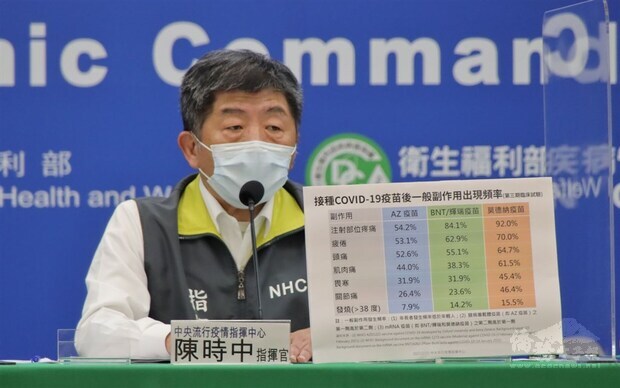
The WHO released recommendations on Feb. 12 for the use of the vaccine, which was jointly developed by Oxford University and the British-Swedish pharmaceutical company AstraZeneca.
According to the WHO, the vaccine should be administered in two doses, with an interval of eight to 12 weeks between jabs, said Minister of Health and Welfare Chen Shih-chung , who heads the CECC, at a press conference in Taipei.
The WHO also notes that the vaccine has an efficacy of 63.09 percent against symptomatic COVID-19 infection and that longer dose intervals -- within the eight-to-12 week range -- are associated with greater efficacy.
When Taiwan's Food and Drug Administration granted emergency use authorization (EUA) for the AstraZeneca vaccine on Saturday, it recommended that vaccine doses should be administered four to 12 weeks apart, according to Chen.
The Advisory Committee on Immunization Practices under the Ministry of Health and Welfare, which Chen also leads, has now approved the change from a minimum four week gap between doses to eight weeks, he said.
New data from AstraZeneca also shows that longer intervals between doses are associated with higher efficacy, said Chen.
If the second dose of the vaccine is administered 12 weeks after the first dose, it is 82.4 percent effective in preventing symptomatic infection, Chen said.
The vaccine was 54.9 percent effective in preventing symptomatic infection if the doses were administered under six weeks apart, 59.9 percent if the gap is six to eight weeks and 63.7 percent if the gap is nine to 11 weeks, according to the study.
The data, in pre-print form, was based on over 14,000 people enrolled in clinical trials across Britain, Brazil and South Africa and was published in the Lancet on Feb. 1. It has not been peer-reviewed.
Concerns have been raised, therefore, as to whether there are other factors influencing the dramatic improvement in efficacy in recipients who were given the two doses further apart, as the trial did not intend to test this variable. Rather, the longer space between doses was caused by manufacturing delays.
To date, Taiwan has secured 10 million doses of the AstraZeneca vaccine, 5.05 million doses of the Moderna vaccine and 4.76 million doses through COVAX.
The first batch of 200,000 doses Taiwan will receive under COVAX will be the AstraZeneca vaccine.
Taiwan on Tuesday reported no new COVID-19 cases for the third consecutive day, with the total number of cases in the country remaining at 942.